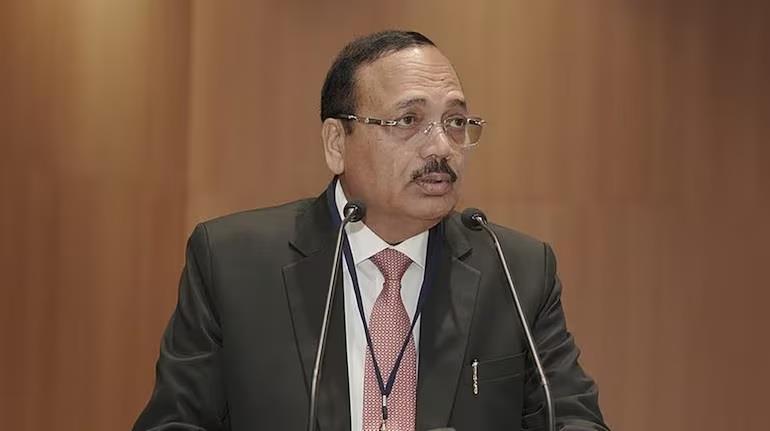
Justice Surya Kant Appointed Next CJI
File photo of Justice Surya Kant
New Delhi ~ Justice Surya Kant, who was on Thursday appointed as the 53rd Chief Justice of India, has been part of several landmark verdicts and orders on abrogation of Article 370, removing Jammu and Kashmir's special status, the Bihar electoral rolls revision, the Pegasus spyware case, corruption and gender equality.
Justice Kant, the second senior-most judge of the apex court, will take the oath of office on November 24 and remain CJI for nearly 15 months. He will demit office on February 9, 2027, on attaining the age of 65 years.
The Department of Justice in the Union Law Ministry issued a notification announcing Justice Kant's appointment.
ADVERTISEMENTThe process to appoint Justice Kant as successor of incumbent CJI B R Gavai was set in motion last week by the Law Ministry. He was elevated to the top court on May 24, 2019.
On October 27, Justice Gavai recommended to the Centre the name of Justice Kant as the next CJI.
Born on February 10, 1962, in the Hisar district of Haryana to a middle-class family, Justice Kant went from being a small-town lawyer to the country's highest judicial office, where he has been part of several verdicts and orders of national importance and constitutional matters. He also has the distinction of standing 'first class first' in his master's degree in law in 2011 from Kurukshetra University.
Justice Kant, who penned several notable judgements in the Punjab and Haryana HC, was appointed the chief justice of the Himachal Pradesh HC on October 5, 2018.
His tenure as an SC judge is marked by verdicts on the abrogation of Article 370, free speech and citizenship rights.
The judge was part of the recent presidential reference on the powers of the governor and president in dealing with bills passed by a state assembly. The verdict is keenly awaited with potential ramifications across states.
He was part of the bench that kept the colonial-era sedition law in abeyance, directing that no new FIRs be registered under it until a government review.
Justice Kant also nudged the Election Commission to disclose the details of 65 lakh voters excluded from the draft electoral rolls in Bihar while hearing a batch of petitions challenging the poll panel's decision to undertake special intensive revision of the voters list in the poll-bound state.
In an order that emphasised grassroots democracy and gender justice, he led a bench that reinstated a woman sarpanch unlawfully removed from office and called out the gender bias in the matter.
He is also credited with directing that one-third of seats in bar associations, including the Supreme Court Bar Association, be reserved for women.
Justice Kant was part of the bench that appointed a five-member committee headed by former top court judge Justice Indu Malhotra to probe the security breach during Prime Minister Narendra Modi's visit to Punjab in 2022, saying such matters required“a judicially trained mind”.
He also upheld the One Rank-One Pension scheme for defence forces, calling it constitutionally valid, and continues to hear petitions of women officers in the armed forces seeking parity in permanent commission.
In another notable case, he upheld the Char Dham project in Uttarakhand, emphasising its strategic importance for national security while balancing environmental concerns.
His bench also observed that“freedom of speech is not a licence to flout societal norms” while cautioning podcaster Ranveer Allahbadia for“derogatory” remarks.
Justice Kant headed a bench which pulled up several stand-up comedians, including“India's Got Talent” host Samay Raina, for ridiculing disabled people on their shows and directed the Centre to come up with guidelines for regulating online content.
Holding that freedom of speech is not absolute, Justice Kant led a bench which pulled up Madhya Pradesh minister Vijay Shah for his remarks targeting Col Sofiya Qureshi, who gained nationwide prominence for media briefings on 'Operation Sindoor', saying every word uttered by a minister has to be with a sense of responsibility.
He has repeatedly underscored that corruption undermines governance and public trust.
In a 2023 verdict, he called it a“serious societal threat” and ordered the CBI to probe 28 cases exposing an“unholy nexus between banks and developers” that defrauded homebuyers.
He also led a bench that granted bail to former Delhi CM Arvind Kejriwal in CBI's excise policy case, remarking that the agency must work to dispel the notion of being a 'caged parrot'.
His bench flagged the absence of a legal framework for domestic workers, directing the Centre to form an expert committee to propose protective measures for this vulnerable workforce.
He has been part of over 300 benches since his elevation to the Supreme Court.

Legal Disclaimer:
MENAFN provides the
information “as is” without warranty of any kind. We do not accept
any responsibility or liability for the accuracy, content, images,
videos, licenses, completeness, legality, or reliability of the information
contained in this article. If you have any complaints or copyright
issues related to this article, kindly contact the provider above.


















Comments
No comment